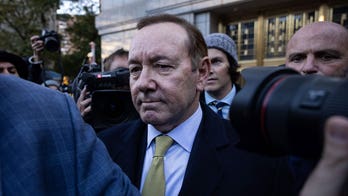Prince family members gather for memorial service
Reportedly gave fans purple boxes full of memorabilia
Prince's sister says the superstar musician had no known will when he died, and filed paperwork Tuesday asking a Minneapolis court appoint a special administrator to oversee his estate.
The amount of money Prince left behind is unclear. A fortune originally estimated in the hundreds of millions could be much, much less, and future earnings off the pop star's catalogue and brand could dwarf what he died with.
Prince owned a dozen properties in and around his famous Paisley Park complex in suburban Minneapolis: mostly rural pieces of land and some houses for family members. Public records show those properties were worth about $27 million in 2016.
Prince sold over 100 million albums on his lifetime, according to
Warner Music Group. And Pollstar, a concert industry magazine, said that in the years that his tours topped the charts — 10 years over four decades performing — the tours raked in $225 million in ticket sales. Prince's best-earning touring year, when he took in $87.4 million, was 2004, the year he was inducted into the Rock and Roll Hall of Fame and two decades after the soundtrack to "Purple Rain" went multi-platinum.
But what remained in Prince's hands is, by any estimate, less than the sum of ticket and album sales. In every record deal, a cut goes to the label, background performers and music publishers, though Prince published and wrote his own songs. Concert ticket revenue is split among the venue, the promoter, staff and the cost of travelling around. And Prince was known to throw expensive parties. Court battles in recent years suggest money wasn't free flowing.
In April 2013, Prince lost a suit filed in New York State's Supreme Court brought by perfume maker Revelations Perfume and Cosmetics Inc. for failing to promote the "3121" perfume line. He was ordered to pay $4.4 million; he never did. Instead, plaintiff lawyers went searching for assets, found about $3 million in various Minnesota bank accounts, and used court orders to freeze them, according to Brian Slipakoff, a New York lawyer who represented the perfume maker. Prince settled for a lower amount shortly after.
Prince encountered tax difficulties several times over the years as well, including owing back taxes to France in 2012, which he paid up, and overdue property taxes around $450,000 in 2010. In 2013, the IRS filed a federal tax lien against him in Carver County, Minnesota, Court for $1.6 million. What happened with that case is unclear. Records on file with Carver County, where Paisley Park is located, show that he was up to date on his property taxes when he died.
Estimates of how much licensing his personal brand will bring in after death, however, reach to the purple clouds.
"He was as big as they get," said Mark Roesler, chief executive of CMG Worldwide, which handles licensing for the estates of Marilyn Monroe, James Dean and other late stars.
Roesler estimates Prince's post-mortem earnings will match top-earning deceased celebrities like Elvis Presley, whose estate made $55 million in 2015, according to Forbes magazine.
But Prince could even dwarf that amount. Michael Jackson's estate, for example, has made over $1 billion since his death in 2009, Forbes reports.
Nelson asked that Bremer Trust, a corporate trust company, be named
administrator of the estate. The court documents say Breber Bank
provided financial services to Prince for many years.
The Associated Press contributed to this report.







